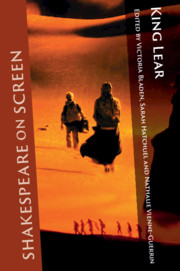Book contents
- Shakespeare on Screen: King Lear
- Series page
- Shakespeare on Screen: King Lear
- Copyright page
- Dedication
- Contents
- Illustrations
- Notes on Contributors
- Series Editors’ Preface
- Acknowledgements
- Chapter 1 Introduction: Dis-locating King Lear on Screen
- Part I Surviving Lear: Revisiting the Canon
- Chapter 2 Lear’s Fool on Film: Peter Brook, Grigori Kozintsev, Akira Kurosawa
- Chapter 3 Wicked Humans and Weeping Buddhas: (Post)humanism and Hell in Kurosawa’s Ran
- Part II Lear en Abyme: Metatheatre and the Screen
- Part III The Genres of Lear
- Part IV Lear on the Loose: Migrations and Appropriations of Lear
- Index
- References
Chapter 2 - Lear’s Fool on Film: Peter Brook, Grigori Kozintsev, Akira Kurosawa
from Part I - Surviving Lear: Revisiting the Canon
Published online by Cambridge University Press: 10 September 2019
- Shakespeare on Screen: King Lear
- Series page
- Shakespeare on Screen: King Lear
- Copyright page
- Dedication
- Contents
- Illustrations
- Notes on Contributors
- Series Editors’ Preface
- Acknowledgements
- Chapter 1 Introduction: Dis-locating King Lear on Screen
- Part I Surviving Lear: Revisiting the Canon
- Chapter 2 Lear’s Fool on Film: Peter Brook, Grigori Kozintsev, Akira Kurosawa
- Chapter 3 Wicked Humans and Weeping Buddhas: (Post)humanism and Hell in Kurosawa’s Ran
- Part II Lear en Abyme: Metatheatre and the Screen
- Part III The Genres of Lear
- Part IV Lear on the Loose: Migrations and Appropriations of Lear
- Index
- References
Summary
The chapter studies three remarkable films of King Lear created in England, Russia and Japan by three directors of international stature: Peter Brook, Grigori Kozintsev and Akira Kurosawa. The films are all set in the past and all are culturally specific. Because the Fool’s role is so central to the substance and structure of Shakespeare’s play, investigating – using a mixture of thick description, cultural appropriation and cinematic formalism – how these three directors reimaged the Fool to speak out from their particular cultures to a global audience provides insight into the ways each reinvents Shakespeare’s bleakest tragedy for the screen.
- Type
- Chapter
- Information
- Shakespeare on Screen: King Lear , pp. 33 - 46Publisher: Cambridge University PressPrint publication year: 2019
References
Works Cited
- 1
- Cited by

